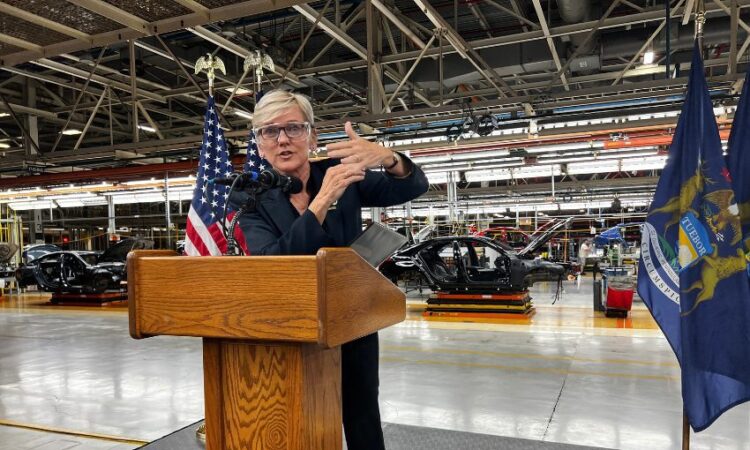
Hundreds of millions of dollars in federal funding awarded through the Biden-Harris administration is set to help protect thousands of automotive manufacturing jobs.
LANSING—US Energy Secretary Jennifer Granholm said a $500 million federal grant awarded this week to an automotive assembly plant in the Capital City will help to protect hundreds of jobs and propel Michigan to the forefront of the nationwide transition to electric vehicles.
The former two-term Michigan governor returned to her old stomping grounds in Lansing on Thursday to announce the federal funding, which is set to help General Motors with a massive, $1.4 billion retooling of its Grand River Assembly Plant to support electric vehicle production.
“Instead of standing on the sidelines while other countries poach our jobs, we’re back in the game, baby,” Granholm said during a press conference on Thursday. “The United States is back in the global game of getting manufacturing to come here rather than seeing it go overseas. We’re bringing it back to the workers who started it all, to the communities that we love.”
Granholm said a $500 million federal grant (paired with a $900 million investment from General Motors) will fully convert the Lansing assembly plant from combustion vehicles to EV production—ultimately ensuring that about 650 United Auto Workers union members who work at the factory are able to retain their jobs as automakers steer toward an all-electric future.
The grant is part of nearly $2 billion in federal funding that was awarded nationwide on Thursday through the Inflation Reduction Act—namely to restart or expand EV manufacturing and assembly at 11 sites across eight states. All told, Granholm said the grants will help to “save” the livelihoods of 15,000 automotive manufacturing workers, as well as create 3,000 new jobs across Michigan, Pennsylvania, Georgia, Ohio, Illinois, Indiana, Maryland, and Virginia.
The grant in Lansing is set to support the creation of at least 50 new jobs, officials said.
“This factory will stay open and your job will remain right here in Lansing, Michigan,” Granholm said. “We’re going to save hundreds of jobs. … We want to assist in converting facilities that would otherwise be closing, so companies have a reason to stay in historic auto communities.”
The funding will cover a broad range of the US automotive supply chain—including parts for electric motorcycles and school buses, hybrid powertrains, heavy-duty commercial truck batteries and electric SUVs, according to the White House. Lansing Mayor Andy Schor also said the funding will help put Michigan one step closer to becoming the “EV Capital of the World.”
“We know the president hasn’t forgotten us and he’s thinking about us here in Michigan everyday,” Schor said. “We put the world on wheels. We know that. And now we know that for the next generation of cars, we’re going to put the world on electric wheels—on EV wheels.”
Transportation accounts for the single largest source of US greenhouse gas pollution and the Biden-Harris administration has made electric vehicles a key part of its climate agenda. The grants will also help deliver on the Biden-Harris administration’s commitment to ensure the future of the industry is made in America by American union workers, Biden said in a statement.
“Building a clean energy economy can and should be a win-win for union autoworkers and automakers,” Biden said. “This investment will create thousands of good-paying, union manufacturing jobs and retain even more—from Lansing, Michigan to Fort Valley, Georgia—by helping auto companies retool, reboot and rehire in the same factories and communities.”
GM production lines will support and benefit from ongoing investments in a US battery supply chain, accelerating the commercialization of advanced, affordable EVs, the White House said.
The new grants complement $177 billion in private sector investment in EV and battery manufacturing since Biden took office, Granholm said. Awards are subject to negotiations to ensure that commitments to workers and communities are met. The Energy Department is also expected to complete environmental reviews before the money is awarded later this year.
“Today is a triumph for GM and for building the cars of the future,” Granholm said. “It’s a triumph for the American United Auto Workers. These jobs are staying right here in Lansing. … If it’s a clean energy revolution the world wants, then it’s what they’re going to get. But you better believe it’s going to be proudly stamped: Made in America, and Made in Michigan.”
In a statement, US Rep. Elissa Slotkin (D-Michigan) also celebrated the federal funding.
“The next generation of vehicles should be built by American companies and American workers,” Slotkin said. “Whether or not you drive an EV today, or ever care to, there’s no denying they will be a big part of the vehicles of tomorrow. … It’s a clear win for Lansing.”
Other companies slated to receive federal grant awards include:
- ZF North America, based in Northville, will receive up to $157.7 million to modernize its Marysville facility to allow for the production of EV components to meet future orders, as well as help preserve more than 500 manufacturing jobs in the local community.
- Blue Bird Body Co., which will receive nearly $80 million to convert a Georgia site previously used to make diesel-powered motorhomes to produce electric school buses.
- Fiat Chrysler will receive nearly $335 million to convert an idled assembly plant in Illinois to assemble electric vehicles, and $250 million in a separate grant to convert an Indiana transmission plant to make electric drive modules for EVs.
- Harley-Davidson will receive $89 million to expand a facility in York, Pennsylvania to make electric motorcycles.
- Volvo Group will receive $208 million to upgrade three manufacturing facilities that supply and build Mack and Volvo-branded heavy-duty trucks.
READ MORE: Federal funds spark ‘clean energy boom’ in Michigan with 21,000+ new jobs
The Associated Press contributed to this report.







